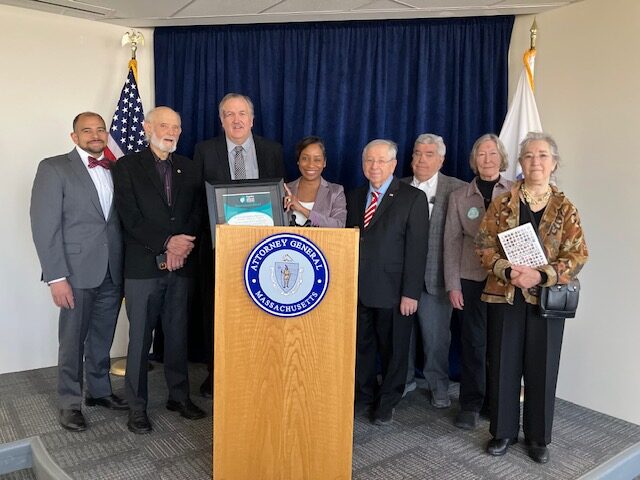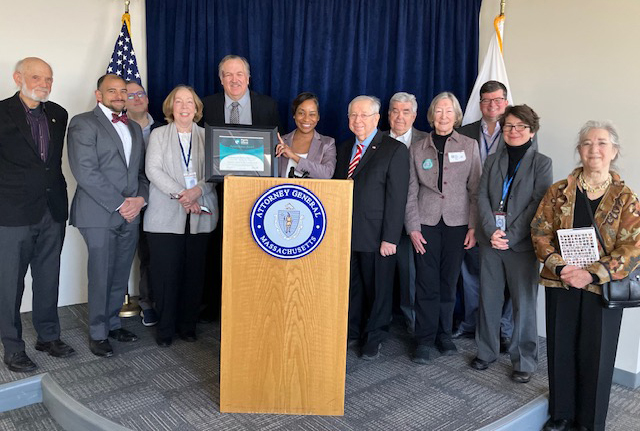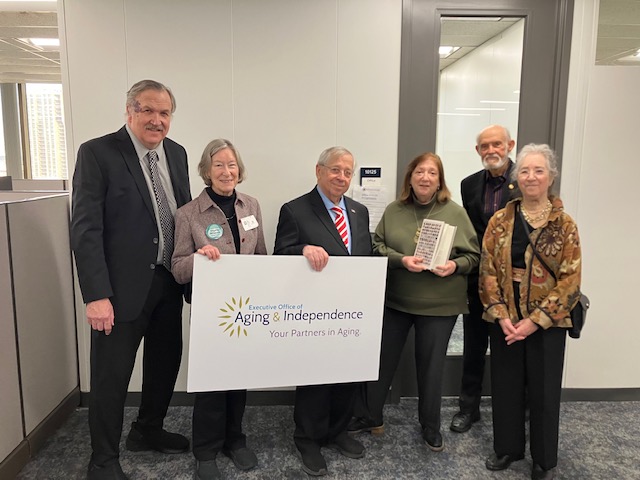Dignity Alliance Massachusetts selected Attorney General Andrea Joy Campbell as its “Champion of Dignity and Care” for 2024. The award was presented on January 29, 2025.


Assistant Attorney General Mary Freeley; Clarence Richardson NAELA; Attorney General Andrea Campbell; Richard T. Moore, DignityMA, John Ford, Northeast Justice Center; Wynn Gerhard, Massachusetts Guardianship Policy Institute; Andrew Musgrave, Assistant Attorney General in the Elder Justice Unit; and Val Frias, Deputy Director of the Elder Justice Unit.


“The Attorney General is the first Constitutional Officer chosen to be honored by Dignity Alliance. In 2022 and 2024, the non-profit, all-volunteer, statewide advocacy coalition has recognized federal and state legislators and legislative staff for helping to improve the lives of older adults, people with disabilities and their caregivers, according to Paul Lanzikos, DignityMA Coordinator.
In announcing the award, Mr. Lanzikos stated, “Attorney General Campbell established an Elder Justice Unit headed by an Assistant Attorney General and appointed an Elder Justice Council. The Council includes participants of Dignity Alliance Massachusetts and the Massachusetts Chapter of the National Association of Elder Law Attorneys. Early in her tenure she co-chaired a group of attorneys general from eighteen states to support federal rules to make nursing home ownership more transparent, and also rules to improve nursing home staffing. In addition, she has successful prosecuted several nursing homes for Medicaid fraud.”
Former Senator Richard T. Moore (D-Uxbridge), also a cofounder of Dignity Alliance and chair of the organization’s Legislative Work Group, added, “In addition to the Attorney General’s leadership to increase accountability and transparency in nursing home issues, she is working to strengthen consumer rights in another aspect of long-term care – assisted living.”
In addition to receiving Dignity Alliance’s highest award, Coordinating Committee member, Margaret Morganroth Gullette, presented the Attorney General with a copy of her latest book, “American Eldercide.” The book, which has been nominated for a Pulitzer Price, concerns the death of 200,000 nursing-home residents during the covid-19 pandemic. The author argues that this mass die-off — in which a tiny share of the overall population suffered some 20 percent all U.S. pandemic fatalities — was thoroughly avoidable. It happened not because all nursing-home residents are old and frail, but due to neglect, mismanagement, and the ultimate, deadly expression of ageism.
Her central and very salient point is that as contained environments, nursing homes and other institutions (like prisons) should’ve been the easiest to shield from infection — and not have turned into death houses, as they so often did. She argues that nursing-home residents were allowed to expire in such numbers because the rest of society viewed it as inevitable that old people die and considered it better than if younger people were disproportionately hit.
Congratulations to Secretary Robin Lispon
Dignity Alliance Massachusetts congratulates Secretary Robin Lispon on her selection as Secretary and the approval of the agency’s new name, Executive Office of Aging and Independence.
Margaret Gullette presented Secretary Lipson a copy of her recently published book, American Eldercide.

